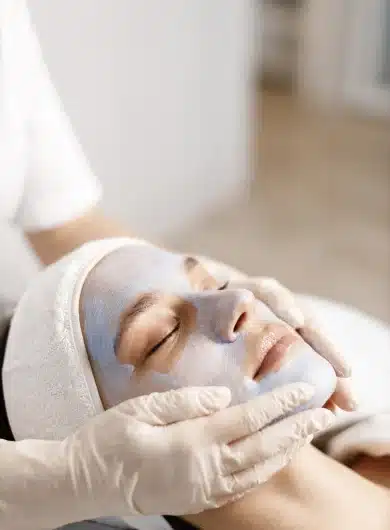The aim is to improve the appearance of the skin – for example, by reducing age spots and evening out skin tone.
- Unit 1-3, First Floor, Suria @ North Kiara,
- No. 10 Jalan Sri Bintang, Segambut,
- 52100 Kuala Lumpur, Malaysia.

The aim is to improve the appearance of the skin – for example, by reducing age spots and evening out skin tone.
A chemical peel is a cosmetic procedure where a chemical solution is applied to the skin to remove its outer layers. This process stimulates the growth of new, smoother skin with improved texture, tone, and appearance.
Types of Chemical Peel Treatment :
There are three main types of Chemical Peel categorized based on their depth of penetration:
Superficial Peels: These peels use mild acids, like alpha hydroxy acids (AHAs) or beta hydroxy acids (BHAs), to exfoliate the outermost layer of the skin (epidermis). They address mild skin concerns like fine lines, acne, uneven skin tone, and dryness. Superficial peels generally require minimal downtime and can be repeated every 2-5 weeks.
Medium Peels: These peels use trichloroacetic acid (TCA) to penetrate deeper into the skin, reaching the upper part of the middle layer (dermis). They can improve moderate wrinkles, acne scars, and uneven skin tone. Medium peels typically require a few days of downtime.
Deep Peels: These peels use phenol, a stronger acid, to penetrate the deepest layers of the skin. They are suitable for severe wrinkles, sun damage, and precancerous growths. Deep peels require the longest recovery time, often involving significant swelling and peeling, and are usually performed under sedation.
Benefits of Chemical Peel Treatment :
Kojic Acid:
Glycolic Acid:
There are a few Chemical Peel Treatment that could be considered in this category:
Mesoestetic Peels: These are a range of professional-grade chemical peels known for their effectiveness and safety. They offer various formulations to address specific concerns like hyperpigmentation, aging, acne, and more. They are designed to deliver noticeable results with minimal downtime compared to deeper peels.
TCA Peels (lower concentrations): Trichloroacetic acid (TCA) peels can be customized to different concentrations. Lower concentrations (around 15% or less) can provide significant improvement in skin texture, fine lines, and discoloration with relatively short downtime compared to higher TCA concentrations.
Modified Jessner’s Peels: This peel combines lactic acid, salicylic acid, and resorcinol for a deeper exfoliation than superficial peels but with less downtime than a full Jessner’s peel. It’s effective for treating acne, melasma, and photodamage.
The choice of the most efficient peel for you depends on several factors, including:
The comfort level during a chemical peel can vary depending on several factors:
Everyone experiences pain differently. What one person finds tolerable, another may find uncomfortable.
Chemical Peel Treatment do not have a permanent effect. The results of chemical peels can last from a few weeks to several months, depending on the type of peel used.
However, while the effects are not permanent, chemical peels can offer lasting improvements to the skin. Here’s how:
Skin Regeneration: Chemical peels stimulate collagen production and cell turnover, which can lead to long-term improvements in skin texture, tone, and elasticity. These improvements can last months or even years, depending on individual factors and skincare habits.
Addressing Underlying Concerns: Peels can effectively address underlying skin concerns like acne, sun damage, and hyperpigmentation. By improving these issues, the skin is healthier and less prone to future breakouts or damage, leading to more lasting results.
Cumulative Benefits: Repeated chemical peels can offer cumulative benefits, with each subsequent treatment building on the previous one. This can lead to gradual and sustained improvement in the skin’s appearance over time.
Different Types of Chemical Peels and Their Duration:
Chemical Peel themselves aren’t drugs, but the solutions used in them often contain active ingredients that are regulated. Here’s what you should know about the safety aspect:
Malaysia-Specific:

Chemical Peel Treatment can be beneficial for a wide range of patients with various skin concerns.
More than 140 five-star reviews on Google
Dr. Lee at Regions Clinic has been my trusted doctor for several years now, and I couldn't be happier with the care I've received. Dr. Lee is the epitome of professionalism, always available to provide valuable advice to patients like me. Their expertise and dedication to their craft are truly commendable. I highly recommend Dr. Lee and the entire team at Regions Clinic for anyone seeking top-notch aesthetic care.
Excellent clinic, I got my appointment for birthmark removal very quickly and the treatment was done right away after consultation. The doctor answered all my questions and done the treatment very professional and painless. The staff is super kind and very helpful. I highly recommend this clinic
This is one of my trusted clinic. I would like to share my experience of facial treatments for this clinic. I did subcision +co2 laser and exosome. I am feeling so impressive with the doctor and staffs are friendly and professional. They will check what skincare I've been using and analyse what type of my skin and what skincare i suppose to use. With treatment courses, skincare and service are reasonable price. I can see my result within few months. They will follow up and answer the questions willingly. I got many compliments about my facial treatments hehe. Beyond my expectations. Keep it up for great services. 👍👍👍 See you again next time.
You will undergo the normal healing process, including the degree of redness, peeling, and any potential discomfort you might experience.
Your skin will be more sensitive after a peel, so it’s crucial to use gentle, non-irritating products. Ask for specific recommendations for cleansers, moisturizers, and sunscreens.
Sun protection is crucial after a chemical peel to prevent further damage and hyperpigmentation. Ask about the recommended SPF level and how often you should reapply sunscreen.
Your practitioner will advise you when it’s safe to start using your regular skincare products, including retinoids or other active ingredients.